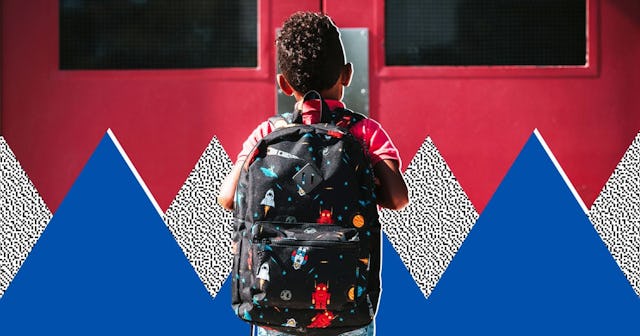What To Do When Your Child Hates School

I had high hopes for my daughter’s first day of school. She is friendly, outgoing, generous, funny, and kind, and she loved pre-K. Even after six hours in the classroom, I struggled to get her to leave. I don’t blame her. Her teachers were firm but compassionate, the facility had two playgrounds and an indoor gym, and when they weren’t sitting criss-cross applesauce on the blue ABC rug, they were playing in the kitchen or science center.
They were coloring, painting, and creating art.
But kindergarten was different. The days were long, the coursework was complicated and hard — at least for her young mind — and while her first day went well, as did the remainder of the month, her temperament cooled with the weather.
My overworked and overtired daughter struggled to read and write.
She also encountered her first bully: a small boy began pushing and hitting her in their after-school program. As such, my daughter became despondent and discouraged. She lost her spark.
Carter Diastika/Reshot
Of course, my daughter is not alone. Many children dislike school, and whether their difficulties are academic or social doesn’t matter. Children across the country feel overloaded, overburdened, fatigued, neglected, and bored. And that is a problem, especially since Dr.David Rock, co-founder of the NeuroLeadership Institute, found a child’s happiness is directly tied to their academic success. Kids who are happy in school learn more. So what can you do?
Here are the best ways to help your child if they do not like school.
Know The Signs
While some children will tell you they dislike school, others will not — particularly young children, as they may have difficulty explaining their thoughts, feelings, and emotions. Instead, their stress will manifest in physical ways, i.e. kids may have headaches or stomachaches. “Butterflies” are common, as is nausea, and according to Kids Health, sleep disturbances can also be a sign of stress.
Insomnia, hypersomnia, and nightmares can occur.
Some elementary age children will cry, and others will hide. My own daughter became hysterical earlier this year.
As for older children, mood-based responses are usually a solid indicator something is wrong. Teens typically become short-tempered or withdrawn. Depression and anxiety are quite common, and some “act out” in violent, aggressive, or dangerous ways to compensate, especially if they feel they out of control.
How To Help Young Children
Before you can help your child, you must identify the problem. Is your little one finding the workload unmanageable? Are they having comprehension issues, disciplinary issues, or anxiety-related issues? Is bullying and peer pressure a problem? Well, it could be any of these factors — and more.
As a parent, you must help your child identify their trigger and solve the problem.
So investigate. Play detective. Be mindful when changes in his or her demeanor occur, as this can help you both identify triggers, and then discuss your observations with your child.
I found my 6-year-old became anxious when she was confronted with a subject she did not fully grasp or understand, and this caused her to shut down. At school, she would tell her teachers “I don’t know” because that was easier than being wrong. But we discussed her fears. I applauded her victories and accomplishments. I encouraged her when she “fell” or “made a mistake,” and I listened because children need to feel understood and heard. Communication is key.
Role playing is also a great way to engage young children. Use play time to talk about fears, stress, and coping skills.
Matthew Henry/Burst
And whatever you do, don’t minimize their feelings. Listen to their concerns. Work with them to develop a tangible solution and/or strategy, and while you should be firm in your resolve — your kiddo has to go to school — avoid lectures. They need to know you have their back.
Talking With Teens, Pre-teens & Young Adults
While your approach is a bit different with teens and young adults — they can communicate their feelings more clearly, they know what they like and dislike, and many are able to vocalize their anger, fear, and/or discontent — most don’t. Many teens and pre-teens feel embarrassed and ashamed. They shut down, or toughen up.
However, as is the case with young children, you must push forward. Ask tough questions. Give them the time and space they need to answer. Keep asking questions, even when they are silent and walk away. If they do speak, listen — without shame, judgment, or stigma. And help them move forward, in a reasonable, responsible way.
For example, if your kiddo is being bullied, you can explain to them what motivates an antagonist’s behavior. You can suggest ways in which they can stand up for themselves, or lean into their friends. You can use literature and pop culture to create a dialogue they understand. You can get them external help — from a counselor, peer support network, therapist, or familial friend — and (if possible) you can give examples from your own life. Knowing they are not alone is huge.
Teenagers also face a lot of pressure, and it is important you use these formative years to help them create a healthy work/life balance, i.e. while academics are important, so are friendships. Even pre-teens need to blow off steam.
Are these points fool-proof? Absolutely not. Conversations can (and will) change based on your child’s situation and needs. But you cannot help your child if you don’t hear them. So stay active. Stay involved. And be present. The parent/child relationship is a powerful tool.
This article was originally published on